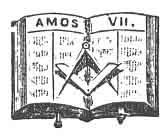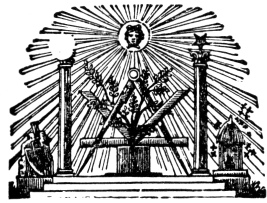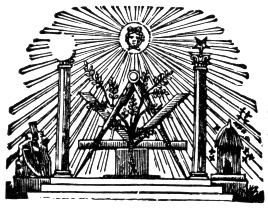Q. What are the jewels of a Fellow Craft?
A. An attentive ear, an instructive tongue, and a faithful breast.
Q. How explained?
A. The attentive ear receives the sound from the instructive tongue, and the mysteries of Masonry are lodged in the repository of a faithful breast.
Q. What were you next shown?
A. The letter G.
Q. To what does it allude?
A. Geometry, the fifth science; but more particularly to the sacred name of the Deity, to whom we should all, from the Youngest Entered Apprentice who stands in the northeast corner, to the Worshipful Master who presides in the east, with reverence most devoutly and humbly bow.
p. 86
This is the end of the Fellow Craft Degree, or Second Degree in Masonry.1
Footnotes
65:1 We are challenged by our opponents to prove that St. John was a Freemason. The thing is incapable of direct proof. Calmet positively asserts that he was an Essene, which was the secret society of the day, that conveyed moral truths under symbolical figures, and may. therefore, be termed Freemasonry, retaining the same form, but practised under another name.–Historical Landmarks, vol. i. p. 167.
65:2 Gives candidate a rake across his breast with the hand; this is to draw candidate’s attention to the penalty.
65:3 The breast being the abode of fortitude, we are taught by the second sign to suppress the risings of apprehension and discontent; and to endure with patience the attacks of adversity, or distress, pain, or disappointment, rather than induce, by a weak and temporizing compliance with the persuasion of friends, or the denunciations of enemies, the bitter stings of remorse which must inevitably result from a betrayal of secrets with which we have been intrusted on the faith of a solemn obligation.–Theo. Phil., p. 289
73:1 One of the rules of the Jewish Cabala is called Transposition, and is used by finding an appropriate meaning to a word formed anagrammatically from any other word. Acting on this rule. Brother Rosenberg, an eminent Jewish Mason, residing in Paris, thus improves the names of these pillars: “In the First Degree, the candidate receives in his preparation the elements of the sciences; it remains for him to instruct or to fortify himself by means of the higher sciences; the word fortify in Hebrew is ZAOB. At the moment when the young neophyte is about to receive the physical light, he should also prepare himself to receive the moral light. he word prepared in Hebrew is NIKAJ.”–Historical Landmarks, vol. i.
75:1 SHIBBOLETH. The word in Hebrew has two signification: 1. An ear of grain, and, 2. A stream of water.–Lexicon.
The symbolical interpretation of each floor cloth increases in interest as we gradually advance through the field of corn by the river-side.–Theo. p. 174.
76:1 Shibboleth signifies waters. Thus, when the Ephraimites. prayed the men of Gilead to allow them to pass over, and were asked, in return–To pass over what? they could not answer Shibboleth, or the waters, without betraying themselves to the enemy. . The word chosen by the Gileadites, meaning a stream of waters, being the object immediately before them, was well calculated to put the Ephraimites off their guard. . . We can easily understand the peculiarity of comformation in the organs of speech which produced this defect. A native of the continent of Europe experiences great difficulty in articulating the English th. In countries adjacent to Palestine the same defect prevails.–Historical Landmarks.
86:1 LECTURE. In the Fellow Crafts’ Degree, the first section recapitulates the ceremonies of passing a candidate. The second section gives an account of the ancient division of our institution into operative and speculative Masons, and by striking emblems directs the candidate to an attentive study of the liberal arts and sciences.–Lexicon.
During the preparation, according to the legends of Freemasonry, the workmen’s wages were paid daily, weekly, monthly, and quarterly, in their respective Lodges; and, when the Temple was nearly completed, they were paid in the Middle Chamber. This celebrated apartment was accessible by a winding staircase of stone; the foot of which was guarded by the Junior Warden, and the summit by the Senior Warden of a Fellow Crafts’ Lodge. And how were these wages paid? Without fear or scruple, says the legend, because their employers were entitled to their unlimited confidence.–Theo. Phil., p. 199.

Moe is the founder of GnosticWarrior.com. He is a father, husband, author, martial arts black belt, and an expert in Gnosticism, the occult, and esotericism.





